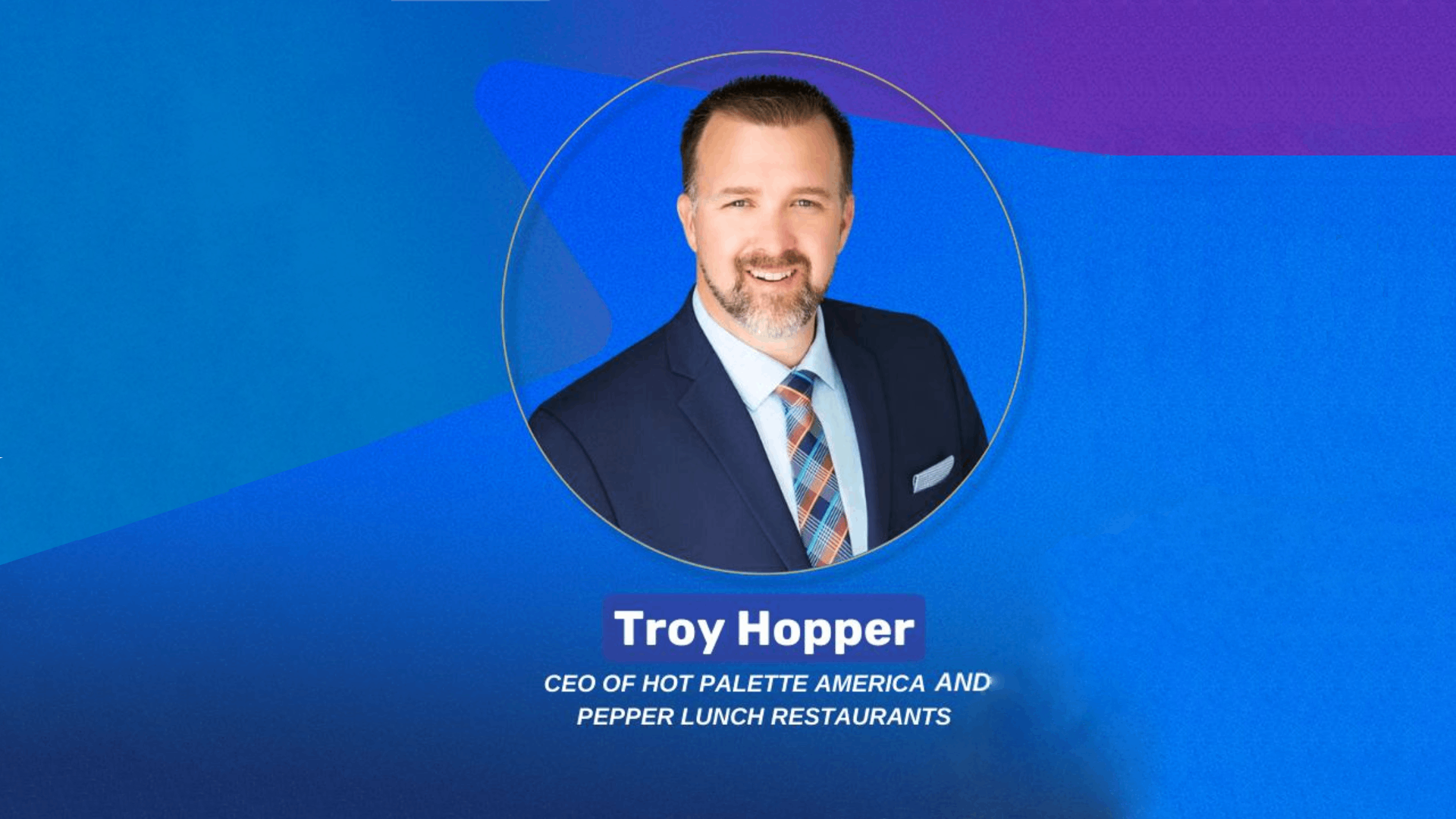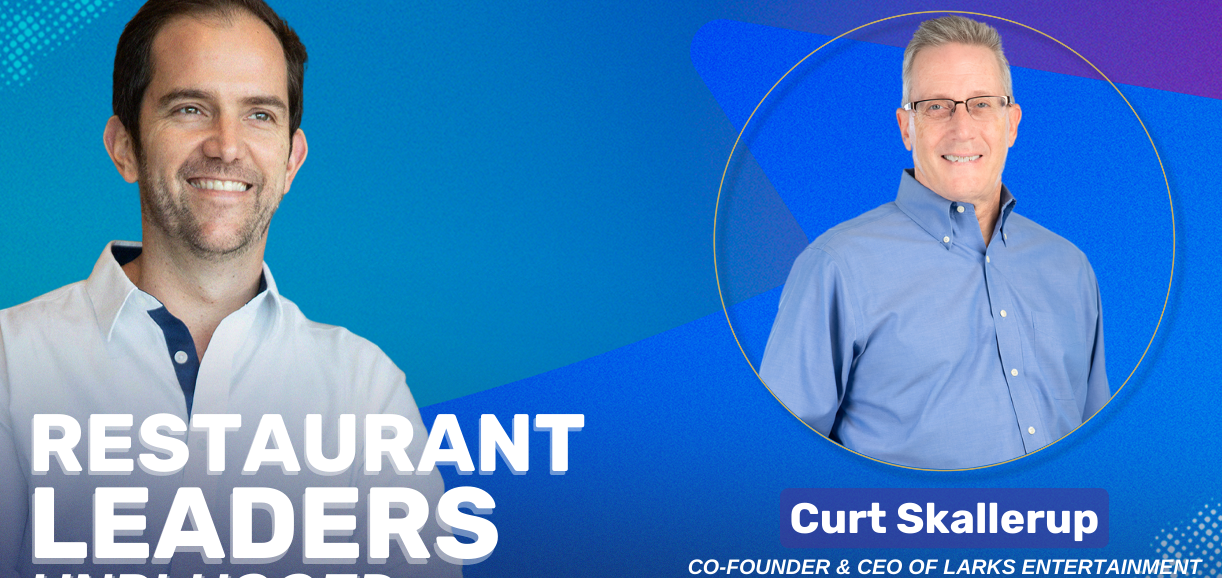
In the latest episode of Restaurant Leaders Unplugged, we sat down with Troy Hooper, a restaurant industry veteran with over 30 years of experience. From turning around distressed assets to scaling one of the most innovative fast-casual concepts in North America, Troy’s journey offers a wealth of insights for restaurant owners who want to grow, scale, and thrive in an ever-competitive market.
As the CEO of Pepper Lunch North America, Troy has successfully expanded this Japanese teppanyaki brand across the U.S., all while staying true to his core leadership values of empathy, humility, and collaboration. If you’re a restaurant owner looking to grow, improve, or simply survive in today’s environment, Troy’s story is filled with lessons you can apply to your own business.
Here’s how Troy transformed restaurants and scaled Pepper Lunch—and what you can learn from his journey.
1. From Construction Sites to Culinary School: The Roots of a Restaurateur
Troy’s path to the restaurant industry was anything but traditional. Growing up in Miami, he spent his childhood on construction sites where his father built restaurants, bars, and nightclubs. His dad had an unconventional way of networking: building venues to become a VIP. This exposure not only sparked Troy’s interest in hospitality but also laid the foundation for his entrepreneurial spirit.
However, Troy didn’t start in business right away. After realizing architecture wasn’t for him, he attended culinary school, where he learned the importance of quality food and back-of-house operations. While his time as a chef was invaluable, Troy eventually felt a pull toward something bigger—owning and scaling his own business.
Key Lesson:
If you want to run a successful restaurant, it’s critical to understand both sides of the business—kitchen operations and business management. Troy’s early days as a chef taught him how to handle the pressures of the back-of-house, while his shift to business school gave him the financial acumen to run large-scale operations.
2. Empathy as the Cornerstone of Leadership
When it comes to leadership, Troy believes one principle stands above the rest: empathy. But he doesn’t mean the soft, feel-good kind of empathy. Troy’s approach is rooted in remembering where he started—from working as an expo and kitchen manager to leading large teams.
As a leader, Troy emphasizes the importance of understanding the unique motivations, communication styles, and challenges of each team member. His mantra? "Your team doesn’t owe you; you owe them."
Key Leadership Practices to Embrace:
- Listen First: Leaders should prioritize understanding their team’s challenges before giving directions.
- Tailor Communication: Different team members respond to different styles. Leaders must adapt their communication to ensure their message resonates.
- Empower, Don’t Control: Successful leaders empower their teams with the resources and tools they need to excel rather than micromanaging every detail.
In a competitive industry like hospitality, where turnover is high and burnout is common, leading with empathy isn’t just a nice-to-have—it’s a must for building a resilient, motivated team.
3. Turning Around Restaurants: People First, Profits Second
Troy’s career includes more than just growing businesses—he’s also known for his ability to turn around distressed restaurant assets. One of his most challenging projects involved a Southern California golf club that had lost money for eight out of the past nine years.
The turnaround required more than just new systems and processes—it needed a cultural shift. Troy started by interviewing every employee and creating a safe space for them to share their thoughts on what needed to change. His approach to winning back the loyalty of the staff, customers, and local community centered around one key principle: put people first, and profits will follow.
Key Takeaways for Restaurant Turnarounds:
- Start with Honest Conversations: Get to the root of the problem by speaking directly with your team.
- Remove Toxic Influences: Sometimes, success requires letting go of the wrong employees or even customers.
- Win Over Your Community: Customers may leave due to bad experiences, but with the right changes, they can be won back.
By focusing on the people—both employees and customers—Troy transformed the golf club into a profitable, vibrant venue once again.
4. Scaling Pepper Lunch in North America: A Case Study in Patience and Vision
Pepper Lunch, a Japanese teppanyaki-for-one concept, is known for delivering an elevated experience in the fast-casual space. Customers are greeted with a sizzling hot plate of protein, rice, and vegetables that they can customize to their taste—a unique, immersive dining experience that’s rare in the fast-casual world.
Troy was brought on to lead the brand’s expansion in North America. But instead of rushing the process, Troy took a patient, long-term approach to scaling. He understood that scaling isn’t about speed; it’s about building the right team, infrastructure, and customer experience.
How Troy Approached Scaling:
- Test and Learn: Before going all-in on a marketing strategy, Troy tested different approaches to see what resonated with the U.S. market.
- Focus on the Team: He hired leaders who believed in the vision of Pepper Lunch and empowered them to help grow the brand.
- Build for the Long-Term: Troy prioritized building a sustainable system that could scale, rather than chasing short-term profits.
The result? Pepper Lunch is growing across the U.S. with new franchise locations opening regularly. By staying patient and sticking to the brand’s core values, Troy is setting up Pepper Lunch for long-term success.
5. The Importance of Empathy and Humility in Scaling
Scaling a restaurant isn’t just about processes and systems—it’s about leadership. Troy stresses that leaders need to be curious and humble. Walking into every situation with the mindset of “How can I learn from this?” allows leaders to grow with their team.
Troy also notes that humility is a daily practice. No matter how much experience you have, staying open to feedback from both employees and customers is key to continuous improvement.
The Mindset of a Successful Restaurant Leader:
- Stay Curious: Ask questions and seek to understand before making decisions.
- Empower Your Team: The people you hire are your greatest assets. Invest in them and give them the tools to succeed.
- Embrace Humility: Recognize that you don’t have all the answers—and that’s okay. True leadership is about learning from others.
6. Key Takeaways for Restaurant Owners
Troy’s journey offers restaurant owners several valuable lessons:
- Scaling takes time: Focus on building the right team and systems rather than rushing growth.
- Empathy is key: Understand the needs of your team, and lead with compassion to build loyalty and motivation.
- Listen to your customers: The best feedback comes directly from your guests—use their insights to improve and evolve.
- Long-term vision matters: Don’t chase short-term gains at the expense of long-term sustainability.
Conclusion: Build for the Future, Lead with Purpose
Troy Hooper’s success isn’t just about strategy—it’s about leadership. By prioritizing empathy, humility, and a long-term vision, he has built a legacy in the restaurant industry that continues to grow. Restaurant owners can learn from Troy’s approach and apply these principles to their own businesses, whether they’re looking to scale, turn around a struggling operation, or simply lead a more motivated team.
Ready for more? Listen to the full episode to hear all of Troy’s insights!
Listen and Watch:



